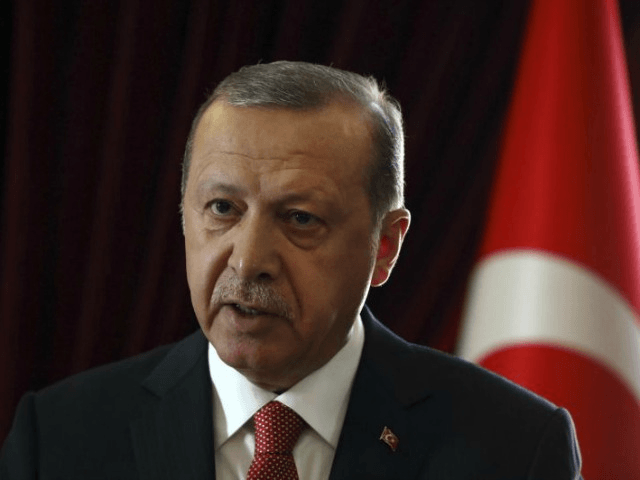The head of Turkey’s anti-Islamist main opposition party accused President Recep Tayyip Erdogan of attempting to implement a “hostage policy” to force the United States to do his bidding on Tuesday, a policy he predicted would fail.
Republican People’s Party (CHP) leader Kemal Kılıçdaroğlu accused leaders of the ruling Islamist Justice and Development Party (AKP) of “lacking reason, calm and dialogue” in dealing with Washington. His remarks follow the sudden shutdown in visa issuances in both the U.S. and Turkish embassies in their respective capitals, the result of the arrest of at least two Turkish nationals working at an American consulate in Ankara.
Those detained stand accused of ties to Fethullah Gulen, an Islamic cleric residing in Pennsylvania who Erdogan claims orchestrated the failed coup against him in July 2016.
According to the Turkish newspaper Hurriyet, Kılıçdaroğlu appeared to link the arrests of two American consulate workers with the arrest of Turkish banker Reza Zerrab and indictment of former Economy Minister Zafer Çağlayan on charges of violating the sanctions against Iran.
“There is a case in the U.S. on Zarrab; the deputy manager of Halkbank is in prison and Zafer Çağlayan is also. Now, they are trying to solve the problem with a hostage policy,” Kılıçdaroğlu said. “The hostage policy would only deepen the problem rather than solve it.”
Kılıçdaroğlu clarified that he believed America refusing to process non-immigrant visas in light of consulate worker arrests was “wrong,” but nonetheless implored “for common sense to prevail and the adaptation of rational policies.”
The CHP is the largest opposition party in Turkey, started by Republic of Turkey founding father Mustafa Kemal Atatürk. It is a member of the Socialist International.
If Kılıçdaroğlu claims that the arrests were retribution for unrelated law enforcement activity in America, the incident would parallel the detention of American pastor Andrew Brunson, who has spent nearly a year in prison in Turkey on charges of supporting Gulen and Kurdish separatist movements. The Turkish government has not clarified how a Christian pastor found himself promoting an Islamic spiritual movement, or what Brunson’s ties to the alleged Kurdish separatists are.
Last month, Erdogan implied that he was keeping Brunson behind bars solely to trade him for Gulen.
“We have given you all the documents necessary [for the extradition of Gülen]. But they say, ‘give us the pastor.’ You have another pastor in your hands. Give us that pastor and we will do what we can in the judiciary to give you this one,” Erdoğan said.
The State Department rejected the offer and once again demanded Brunson’s release.
Turkish police arrested Metin Topuz, tasked with liaison work between the U.S. Istanbul consulate and local law enforcement, on charges of aiding the “Fethullah Terrorist Organization (FETO)”, the Turkish government’s name for “Hizmet,” the Islamic spiritual movement and charter school network Gulen runs. On Tuesday, State Department spokeswoman Heather Nauert confirmed that another consulate employee was also arrested under similar charges.
“Turkey had arrested this year two of our locally employed staff in different locations, and then had called in a third staff member just over the weekend of the United States. So we can confirm over the weekend that a third embassy staff member was summoned by Turkish authorities. That staff member, though, has not been formally arrested,” Nauert clarified.
Nauert noted that “we have not seen any evidence that indicates that our staff members were involved of what the government is accusing them of doing.”
While Turkey regularly demands Washington extradite Gulen, Ankara has also admitted to not providing America with any evidence tying Gulen to the failed coup.
The State Department responded to the arrests by ceasing all non-immigrant visa services for Turkish nationals. Turkish officials then published nearly the exact statement released by the State Department on their decision, except switching out any mentions of the United States for “Turkey” and vice versa.
Erdogan, meanwhile, has called for the State Department to dismiss U.S. Ambassador to Ankara John Bass, who he said he did not “consider … to be Washington’s legitimate representative in Turkey.” Erdogan has also implied that Bass acted unilaterally to suspend visa services.
“Our ambassadors tend to not do things unilaterally. We have a very close coordination and cooperation with our ambassadors, and particular Ambassador Bass,” Nauert responded on Tuesday. “He and I have exchanged phone calls, meetings with one another, on numerous occasions. … This was coordinated with the State Department, it was coordinated with the White House and coordinated with the NSC.”
Bass has described the entire incident as “saddening” and stated, as Nauert did, that “the U.S. has yet to see from the Turkish government any evidence … that led to the arrest of a colleague and to enquiries about another one.”

COMMENTS
Please let us know if you're having issues with commenting.